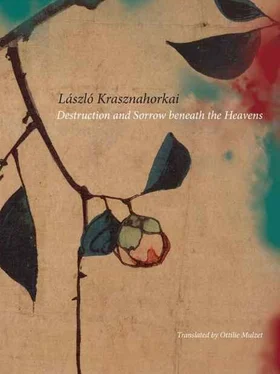But he knows what he is saying, and he understands who Master Ji is; he senses he is on the right track, and it’s no accident that he found him today; he knows, in brief, that he is the one, that it’s because of him that he is here in Suzhou, even if he doesn’t know what it is that he knows, and, mainly, why he feels so certain in all this, more certain than death. He’s the one, he’s the one! — Stein tries to whip up some enthusiasm in the interpreter in the hotel room, who, however, just once again collapses dead tired onto the bed, and falls asleep with the phrase repeating in his head, this ‘He’s the one, he’s the one’—even if, of course, at that point, he can’t have any idea at all if he really is the one; but he can only lead somewhere, not to his self, but he will lead: and in that there can be no mistake.
The next day, at three o’clock in the afternoon, of course, there is Master Ji in front of the entrance gate of the Garden of the Master of the Nets, with a beautiful woman of noble gaze, about the same age as Master Ji; a marvellously handsome man, a little younger than Stein yet seeming somewhat ageless, with long grey hair reaching down to his shoulders; and a younger woman standing beside him, arm in arm, clearly his wife. After the introductions, Master Ji leads them through the tourist groups — only sporadically destructive at this moment — to the end of the garden, to a hidden nook where, under the greatest protection that could possibly exist in such a place, they take a seat in an empty teahouse. All the doors in the teahouse are open, and the back wall of the inner courtyard, grown over with woodbine and overlooking their table, is flooded with the afternoon sunshine.
Master Ji introduces the unknown couple as Wu Xianweng and his wife. They are from Suzhou, but now they have come from Wuxi in order to spend the day with them. And this, he gestures towards the beautiful woman next to him, who blushes a little, is his own wife. Master Ji orders only some bottles of boiling water, then he takes from his pocket a large bag of tea, and tells them that this is Longjing tea, and that this is what they will be drinking, because this is the best. He places the leaves in everyone’s cups and then pours the boiling water over them; for a while there is silence, a little self-consciousness, while from outside, from the courtyard, the twittering of birds can be heard, and the staff withdraws behind a distant counter.
Stein is the first one to speak but it’s as if he wouldn’t have to begin, as if they were in conversation already: he does not introduce himself, which perhaps would have been proper, but begins to speak about what connects him so closely to the arts of China. He speaks in short sentences so that it will be easier to translate: he feels that it doesn’t matter what kind of art one draws close to in China, it doesn’t matter whether one starts out from poetry, music, philosophy, painting, architecture, theatre, calligraphy or the art of gardening, because one always ends up in the same place, as if every form of artistic expression were striving for one and the same conceptualization or depiction. Or as if it were obliged to do so. Because somehow, says László Stein, it is the same with these arts as with our flowers at home, which we really love — we believe that we choose them and we love them. But it is they who choose us, they, who with their enchanting beauty, oblige us to love them and take care of them. Each flower is uniformly beautiful. Together, they share in beauty. What is entrusted to us is to decide the one of which we shall speak. And, he says to Wu, he would now like to speak of the art of gardening, and he would like to know his opinion: What does he, Mr Wu, coming now from Wuxi, see as the essence of the Chinese garden? Is it possible to say that a person can take refuge in a garden of Suzhou, if he wants to be immersed in thought, if he wants to be immersed in a beauty which everywhere else has been lost?
Wu does not answer for a while. He is silent for so long that everyone at the table becomes embarrassed. Embarrassed, but not because they don’t understand his silence but perhaps because they presume that it will be difficult for Stein to understand it. Stein, however, waits patiently, because he thinks that Wu is thinking about his answer. And so he is.
wu. The art of gardening in Suzhou is a product of imperial China. It was created by those who thought they could find their freedom only here, amid the stones, the flowers, the trees and the silence of the pavilions. The Chinese garden is at once the location and the emblem of withdrawal from society. For each individual, the garden was his own world, as it were, the expansion of who he was.
He is a lean man of average height. Up close, now that he is sitting beside Stein at the table, it is particularly striking how beautiful his face is, how immobile. His voice, in contrast to his slender, frail stature, is deep and decisive, full of strength, even if it is barely audible. Stein is sitting the closest, but Wu speaks so softly that he can hardly hear him, and the interpreter — who tries to wedge himself in closer between them — can also hardly hear him. As if he were extremely, endlessly weary. Again he is silent for a long time, but before Stein can speak again, he continues.
wu. The garden, however, is an artificial creation. As for myself, if I try to think of a location suitable for withdrawal, I would never seek out a garden. There are many times when I wish to be somewhere in silence. And at such times I do leave. Then with my wife or my friends I go somewhere away from the city. But it never occurs to us to go to a garden. Only to the mountains, the streams, out into nature.
Stein relates in a few sentences how deeply and radically his own relation to nature has changed over the past 10 or 15 years. He tells Wu about that place, that remote valley high up in the mountains, where he lives. And how his garden is a part of that nature which surrounds him.
wu. That is a fortunate situation. A bountiful life, a life worthy of the human being. I am filled with great joy that you are able to live in this way.
Stein replies by describing how that place where he lives has changed so much in terms of its relationship to poetry. In terms of its relationship to language. That he continually feels as much too crude and harsh that which must be continually, but continually, alleviated — alleviated to the point of infinity.
wu. Art is the means by which one can go from the complex to the simple, but we cannot miss a single intermediary step on the way. Its mission is to penetrate to the essence of something. And that is simple.
Who is this person?! Master Ji sees the effect his friend is having on Stein, and he takes this in with a fairly satisfied and slightly ironic gaiety, like someone who has been equal to the task entrusted to him. After every sentence, Wu is silent for a long time. He sits there, unmoving, his head does not stir, nor his gaze which somehow. . is looking at nothing in particular. He looks a bit at Stein, then away, at the table, at the steaming tea cups, and then again up at him, and then again to one side. Due to his unusually soft speech, Stein feels that an exceptional silence is looming over the teahouse itself in which furthest and the tiniest sound can be heard. The noise, as one of the staff suddenly clinks one teacup against another behind the counter, seems unbearable. There is an unbelievably deep silence.
wu. And in this, as in so many other things, Chan is the most radical. Chan is not interested in what is written down. It doesn’t need any words.
Stein replies that the viewpoint has emerged in Europe as well that the conscientious artist is the one who leaves no works behind.
Читать дальше












